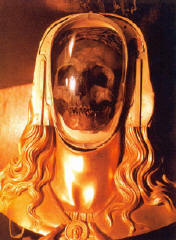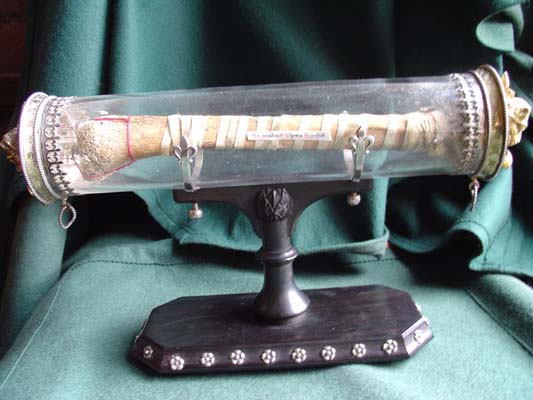 I was watching a video called "Cathedral" in which the building a Gothic Cathedral was explained architecturally this morning. The video did a imitation historical context in which the church being built (Which was one of the many Notre Dame's) was the proud home of the veil the blessed Virgin wore. The veil like all relics had mystical powers, in this case healing. I suddenly remembered how superstitious Catholicism really was/is. A friend of mine who is from Mexico upon finding that I was a Christian asked "So do you believe in saints and virgins?" I really was dumbfounded, when I tell people I am a Christian I don't generally get this kind of follow up question, I am more ready for the "You believe that Bible stuff! HA!" My response to my friends question was "Yeah, I suppose" (I was thinking: There exists persons who are saints...True. And there exists persons who are virgins...true.)
I was watching a video called "Cathedral" in which the building a Gothic Cathedral was explained architecturally this morning. The video did a imitation historical context in which the church being built (Which was one of the many Notre Dame's) was the proud home of the veil the blessed Virgin wore. The veil like all relics had mystical powers, in this case healing. I suddenly remembered how superstitious Catholicism really was/is. A friend of mine who is from Mexico upon finding that I was a Christian asked "So do you believe in saints and virgins?" I really was dumbfounded, when I tell people I am a Christian I don't generally get this kind of follow up question, I am more ready for the "You believe that Bible stuff! HA!" My response to my friends question was "Yeah, I suppose" (I was thinking: There exists persons who are saints...True. And there exists persons who are virgins...true.)Of course what he really meant was in reference to the multiple Latin American appearances of "Mary", and maybe by "saints" he meant these mystical beings we pray to in order to help us out of jams. Anyway, I guess in light of the video I realized afresh just how bizarre Catholicism really is. I think one of the best example of this is the relics.
Why inanimate body parts from dead Christians became prized tokens really is beyond me, I mean who wants a dead guys' head sitting behind the altar? Well I guess when you begin to superstitiously attribute every good fortune that besets you to your kissing St.Clifford's back hair you begin to be dependant on these things to some degree. I really vary in my reaction to all of this from laughing my head off to being grieved that people have been so duped into idolatry.
 That's really what this is, idolatry. When we don't look to God alone for deliverance we are idolaters. Whether it be looking to St.John the Baptists camel hair briefs or looking to our bank accounts to make our problems go away we are guilty the sin of idolatry. So Protestants, don't think that we are free from the deceitfulness of superstitious idolatry...
That's really what this is, idolatry. When we don't look to God alone for deliverance we are idolaters. Whether it be looking to St.John the Baptists camel hair briefs or looking to our bank accounts to make our problems go away we are guilty the sin of idolatry. So Protestants, don't think that we are free from the deceitfulness of superstitious idolatry...Anyway, what I was wondering is "What happened to the relics?" I occasionally listen to the local Catholic channel and I honestly heard last week that there such and such relics on their way to a Milwaukee diocese. I really thought that all this relic junk died out after the reformation, with the exception of a few possibly authentic relics (I prefer artifacts) I thought this was pretty much given up on. I guess not. One would hope that these things would be once and for all laid to rest and no longer treated as go betweens between man and God, but it seems the natural man likes his magic "sacred" items.
So the relics are still popular among the Catholics it seems, I just don't understand how you can't see this as idolatry. This really is a manageable God though, and I think that's why these things have such appeal to people. We can control God through these magical objects and make Him bless us whether the issue is health, finances, or purgatory, these magic objects cover all the areas and insure blessing on those that reverence (shudder) these objects. These seem akin to the Charismatic junk on the Protestant end of
 the spectrum, prosperity hankies, Benny Hinn's anointing oil etc. These are all forms of superstition, and attempts to manage God through objects.
the spectrum, prosperity hankies, Benny Hinn's anointing oil etc. These are all forms of superstition, and attempts to manage God through objects.So the point I want to close on is not a pick on the Catholics and their creepy superstition (I mean come on face it, it's kinda creepy to want to go kiss that "Mary Magedalene" skull in that manikin head!). I want to give us all a general warning to beware trying to manage God. Whether by inanimate object idolatry, or by theological idolatry. Both acknowledge God but rob Him of His power.
Calvin writes:
"Thus, although they are forced to acknowledge that there is some God they however, rob Him of His glory by denying His power.[...] In this way the vain pretext which many employ to clothe their superstition is overthrown. They deem it enough that they have some kind of zeal for religion, how preposterous soever it may be, not observing that true religion must be conformable to the will of God as its unerring standard; that He can never deny Himself, and is no spectre or phantom, to be metamorphosed at each individual's caprice."
That is a stinging indictment on idolatry of all kinds. Whether attributing power to dead men's bones, or treating God as a relativistic/pluralistic truth. The "God's different for everyone" Liberal theology is a form of idolatry...
Calvin continues:
"It is easy to see how superstition , with its false glosses, mocks God, while it tries to please Him. Usually fastening merely on things on which He has declared He sets no value, it either contemptuously overlooks, or even undisguisedly rejects, the things which He expressly enjoins, or in which we are assure that He takes pleasure. Those, therefore, who set up fictitious worship, merely worship and adore their own delirious fancies; indeed, they would never dare so to trifle with God, had they not previously fashioned Him after their own childish conceits." (Institutes of the Christian Religion)
God is only acceptable to the idolater if he can manage Him. Whether through magic objects or by shaving off attributes, only then is God palatable.









9 comments:
what happened to the relics?
they're all pastors now!
anonymous-say what?
Michael-I really am not frustrated over the relic stuff, I think it is actually laughable. Like I said I waver from laughing at this superstition to being grieved over the blatant idolatry.
"Just because Jesus died on a Cross for the sins of all mankind does not mean all mankind will be forgiven of their sins without being washed, being sanctified, being justified."
So did Christ die for the sins of people who will end up being punished for those same sins eternally?
Ha!
Well Calvinists hold to particular redemption, Christ died for the elect (those whom the Father gave Him).
The reason for choosing whom He chose is according to His own good pleasure and ultimatly the goal in mind is the glory of God.
"Blessed be the God and Father of our Lord Jesus Christ, who has blessed us in Christ with every spiritual blessing in the heavenly places, even as he chose us in him before the foundation of the world, that we should be holy and blameless before him. In love he predestined us for adoption through Jesus Christ, according to the purpose of his will, to the praise of his glorious grace, with which he has blessed us in the Beloved." (Eph 1:3-6)
Well I actually would put the challnge of clear citation from the Bible on those who hold to universal atonement. Where does scripture clearly teach that Christ died for the sins of every person who would exist after His advent?
Anyway, here are some passages that I would base particular redemption on:
"He shall see of the travail, of his soul, and shall be satisfied: by his knowledge shall my righteous servant justify many; for he shall bear their iniquities." (Isa 53:11)
here the "many" who are justified are who Christ atoned for.
"I am the good shepherd. I know my own and my own know me, just as the Father knows me and I know the Father; and I lay down my life for the sheep." (John 10:14-15)
Christ lays His life down for the sheep.
"but you do not believe because you are not My sheep." (Jn 10:26)
Christ says of some they are no His sheep. By logical deduction then it follows that Christ did not die for every single person.
The real issue is not so much the extant of the atonement but its effectualness. Reformed theologians hold that Christ death is effectual (it accomplished what He intended ie:the salvation of His people)
The natural man thinks that by making the atonement universal it is somehow better and greater in effect. Well what good is the Arminian view of the atonement if its effectualness is dependent on something I do? So Christ's work really is worthless unless I do something with it.
No, says the Calvinist, Christ's work really does save, it really did accomplish the salvation of sinners. He bought faith for all of His own in it, and through it He gives them eternal life.
"My sheep hear my voice, and I know them, and they follow me.
I give them eternal life, and they will never perish, and no one will snatch them out of my hand.
My Father, who has given them to me, is greater than all, and no one is able to snatch them out of the Father's hand. I and the Father are one." (Jn 10:28-30)
In my mind I see the difference between Arminian and Reformed views of the atonement as a difference in loves. There is the love of the Good Shepherd who knows His own sheep and will not suffer even one to perish. And there is the love of the hireling who sits back and bites his nails while the sheep perish.
The Arminian view of the love of God is that of the hireling.
yeahhhhhhh whatup BOB, this is devin, and the THIRSTY link will take you to my new page, one that hopefully, i will "commit" to, so check it out!
Bob, I try very hard not to get into discussions about salvation by predestination or universalism, etc, etc. But I couldn't help but be struck by one of your comments. You said, By logical deduction then it follows that Christ did not die for every single person.
In the theme of your original post, I would encourage you not to manage God merely through logical deductions. God and His desire to restore the relationship corrupted by sin through the salvation He offers in Jesus is not logical, it's spiritual. It's on a dimension or level that we will not even partially understand until we are with God in eternity.
The meat and potatoes of your discussion with Michael is a very good example of what I was talking about in my last comment to your previous post with the Larry King video the other day about not trying to follow doctrines. There are so many doctrines built and designed through vast academic and studious efforts that unless I put in the same effort myself, I'm not sure I can even try to follow them. Rather, I will try to follow God/Jesus as He is presented in Bible, trusting in the Spirit to guide the interpretations that I gather and those of the community around me.
There are certainly points of Calvinism that I can say - "yah, that makes sense" and certainly points of Universalism that I can say - "yah, that makes sense, too", and it all makes me think that the real answer is somewhere in the middle and in a whole different dimension that only God truly understands. It's a wonderful mystery, and I fully enjoy allowing myself to believe God to be mysterious. It sure takes pressure of me trying to manage God.
Cheers and Merry Christmas!
Hey Tim,
Merry Christmas to you too!
Well the "managing" I am referring to is a managing that tries to control God. In the relics context we treat God as athis force that is minipulated by inanimate objects, to get blessings from. Doing theology can be a form of managing God as you are saying and I said so in the post. But I think it is hasty to declare all theological exposition as forms of managing God therefore I treat God as a mystery so I don't manage Him. I have met a lot of people who think like this and treat their walk with God as some mystical journey.
This plays heavily into how we view the Bible. The people I just mentioned don't really treat the Bible as objective truth about God revealed to men. But rather they treat it like little nuggets of revelation that subjectively inspire individuals and means something different to each reader. Col 2:20 might mean one thing to you in your experiences with God, but for me and my experiences with God it is something completely different. This is subjective relativsm applied to the Bible.
In reality the Bible means what the author's meant (God and the inspired individual). The bible reveals truth about God thus there are areas that are not mystery, for example Christ is the Saviour of man through faith in His sacrifice. The Bible is not exhaustive of the nature and works of God (for then it would be an infinite Book) but based upon that we should not make the leap that God is a mystery. Again because He has revealed much to us in His word.
Post a Comment